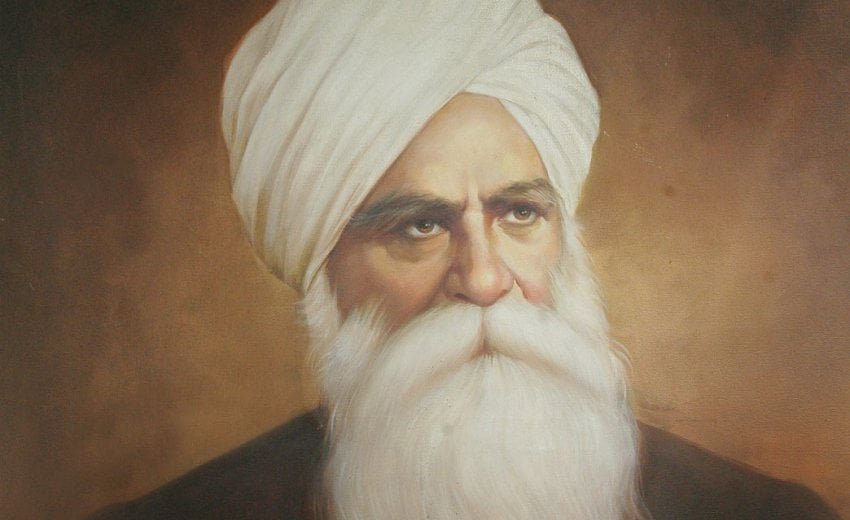Bhai Vir Singh, born on December 5, 1872 and passing away on June 10, 1957, is widely recognized as an important figure in shaping Punjabi literature.
Bhai Vir Singh, born on December 5, 1872 and passing away on June 10, 1957, is widely recognized as an important figure in shaping Punjabi literature. His contributions were so significant that he earned the nickname "The Sixth River of Punjab." Singh's talents spanned various fields - he was not only a poet and novelist, but also an editor, interpreter of religious texts, historian, and journalist. He played a crucial role in the Singh Sabha movement, which brought about a revival of Sikh culture in early 20th century Punjab.
Singh came from a family with a strong academic background and spent his early years in Amritsar, a city of great religious importance. He excelled in his studies, earning a gold medal from the district board upon completing his Matriculation. While still a student, he entered into marriage with Bibi Chattar Kaur.
Often credited with setting the foundation of a new era of Punjabi literature, Bhai Vir Singh's works covered a wide range of genres including prose, novels, poetry, drama, and historical research. He also ventured into journalism, launching Khalsa Samachar, the first daily newspaper in Punjabi. Through this publication, he advocated for various social and religious reforms, such as promoting education, championing women's rights, and working to dismantle the caste system. Singh was instrumental in establishing the Khalsa College in Amritsar and, with Wazir Singh's assistance, set up a printing press in the city in 1892. The following year, he founded the Khalsa Tract Society, aiming to serve both his country and the Sikh community. Singh's scholarly pursuits weren't limited to Sikhism; he also had extensive knowledge of Hinduism, Buddhism, Christianity, and Islam.
Literary Contributions
Bhai Vir Singh was a notable figure who made significant contributions to Sikh literature and culture. He took on the task of editing and publishing important Sikh texts, including Prachin Panth Prakash and the biography of Guru Nanak Dev, known as Janamsakhi. Recognizing the need for a unified Sikh voice, he helped establish the Chief Khalsa Diwan, an organization aimed at promoting religious and social reforms within the Sikh community.
Concerned about the low literacy rates of his time, Bhai Vir Singh founded the Sikh Educational Committee to encourage and spread education. His literary works had a profound impact, inspiring a new generation of Punjabi writers. Among those influenced by his writings were novelists such as Nanak Singh, Bhai Mohan Singh Vaid, Charan Singh Shahid, Master Tara Singh, and Gurbakhsh Singh.
Bhai Vir Singh's contributions were widely recognized. He received an honorary doctorate in Oriental Learning from Panjab University. The Sahitya Akademi honoured him with its inaugural award for his outstanding work in Punjabi literature. The Indian government bestowed upon him the Padma Bhushan, a prestigious civilian award. In 1952, he was appointed as a member of the Punjab Legislative Council.
For over five decades, Bhai Vir Singh stood as the foremost writer and theologian in Punjabi, explaining Sikh history and philosophy. Many consider him the modern-day equivalent of Bhai Gurdas, a revered Sikh figure. His most renowned works include "Guru Nanak Chamatkar," "Kalgidhar Chamatkar," "Baba Nodh Singh," and "Meray Saeeyan jeeo."
It is also said that his poetry has a hint and sublimity of the famous English poet John Milton, the spontaneity of the poet William Wordsworth, the music of the revered Rabindranath Tagore and the mysticism of the Irish poet William Butler Yeats. He was considered as the 'finest flower' in the renaissance of modern Punjab. Dr. Vir Singh sang of the struggles of the village folk. He wrote poems on freedom and patriotism.
Spiritual side
Bhai Vir Singh was a versatile individual who excelled as a poet, novelist, and critic. His works often drew inspiration from nature, finding deeper spiritual meanings in everyday objects. For instance, he used the Kikar Tree as a metaphor for spiritual seekers who must endure worldly challenges. His poetry often explored the theme of the individual soul's desire to reunite with the Universal Soul. In his writings, he identified ego as the main obstacle between humans and the divine, suggesting that overcoming it could lead to a direct connection with God. Bhai Vir Singh encouraged people to recognize beauty and divine presence in ordinary aspects of life. He promoted the idea that inner peace and happiness could be achieved through self-discipline and spiritual practices.
In addition to his poetry, Bhai Vir Singh made significant contributions as a historical novelist. His notable works in this genre include "Sundri," "Bijay Singh," and "Satwant Kaur." These novels have gained such widespread popularity that they have been republished numerous times over the years.
Bhai Vir Singh was renowned for both his philosophical insights and his elegant writing style. His prose works often contained poetic elements, displaying a sense of grace and balance. One notable example is Kalgidhar Chamatkar, which features many beautifully written passages. Today, an organization called Bhai Vir Singh Sahitya Sadan works to publish and promote his writings to a wide audience. In 1972, people in India and other countries celebrated the 100th anniversary of his birth.
Bhai Vir Singh's contributions to literature were widely acknowledged. The Indian government honored him with the Padma Shri award, while Punjab University granted him an honorary doctorate. His impact was so significant that the scholar H. Chattopadhaya referred to him as the "sixth river in the land of the five rivers," highlighting his importance to Punjab's cultural landscape.
*Based on an article published in singhstation.net on 10th June 2015
